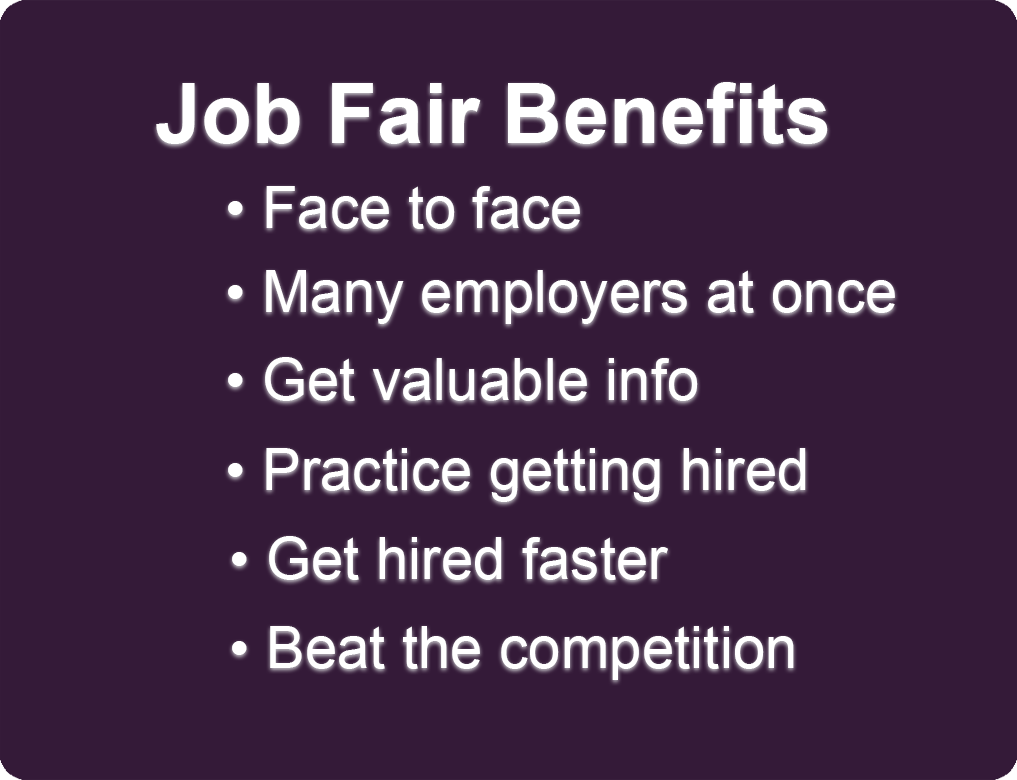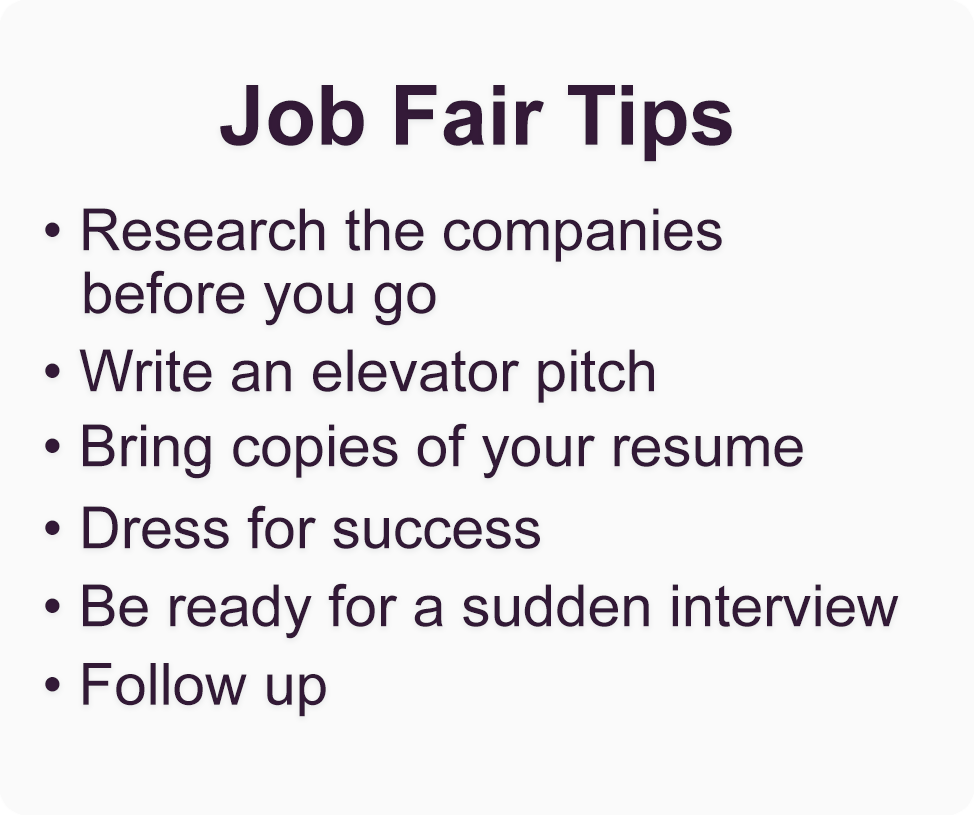What is a Job Fair? Definition, Benefits, and What to Expect
Published: Mar 22nd, 2023
Are you wondering about attending your first job fair?
Imagine this—
You decide to head to a local job fair. You wander into a huge hall, full of booths. You instantly feel out of place and unprepared. Everyone else is in smart clothes, handing out resumes. You have nothing.
Or — you sign up for a virtual job fair. You recognize a few of the attending companies, but others are a mystery. So you click around a bit and quietly wander out again.
No one even noticed you were there.
The problem? You didn’t start by knowing what a job fair is, how they help, and the easy steps to make the most of one.
Had you done that, you could be saying “Yes!” to your dream offer, and calling friends to tell them the great news.
This article explains job fairs from nuts to bolts. You’ll learn what to expect, the benefits of job fairs, and how to shine at them so you get great job offers fast.
What is a job fair?
A job fair, also called a career fair, is an event where different companies share information with potential employees. Company representatives will answer questions, get to know you, and maybe even interview you on the spot. Job fairs can take place in person or virtually, and can be industry-specific or more general.

Benefits of attending a job fair
Job fairs have several key advantages. They let you:
What to expect from a job fair
At an in-person or virtual job fair, you’ll meet with recruiters and hiring managers from different companies. You’ll chat briefly about open positions, and discuss your own skills and qualifications. You might even be invited to an interview — either later or right there, on the spot.
So what exactly happens at a job fair? How does a job fair work? Maybe you’re not even sure if you should attend. Here’s what to expect.
Who attends a job fair?
There’s no “right” person for job fairs. Lots of people attend, from all different backgrounds and for lots of different reasons. But in general, job fairs are designed for the following:
Not sure if a job fair is for you? Start by checking out the job fair’s website. The name of the job fair will often also clue you in to who it’s for and the kind of applicants who should attend. And if the job fair is organized by your university, then it’s a safe bet it’s aimed at students.
What companies will you find at a job fair?
Job fairs host dozens — sometimes hundreds — of employers, often from all different industries. Some of these organizations will be big, well-known brands. Others will be small, local companies. At a job fair, you can find employers from the public and private sector, in every kind of field from big tech to healthcare.
Even big companies like Apple, Google, Microsoft, and Clorox use job fairs to find new team members. Some job fairs are open to employers from a wide range of industries. Others are more targeted. For instance, Harvard has career fairs covering topics like “finance and fintech,” “theatre, entertainment, and media,” and several others.
The job fair’s website should list the companies attending. Check this out in advance — so you know if the fair’s a good match for you and so you can prepare well.
Where is a job fair held?
Local job fairs are typically held in large venues with dedicated events spaces. These are often town halls, hotels, or even sports stadiums. Usually, the location is accessible by public transportation. The job fair’s website will often have a map, plus other details, like accessibility information. At the job fair, each employer will have their own booth or table.
Virtual job fairs take place online. With an online job fair, employers will chat with you face to face, like on a Zoom call. The “calls” use software such as the JobFairX Virtual Hiring Platform to connect employers and job seekers. They’ll be able to interview you one-on-one, too.
Tips for attending a job fair
Feeling nervous about going to your first career fair? You’re not alone. Even registering to attend can feel daunting.
What should you wear? What should you bring with you? What if you make a great first impression — then screw it up?
Relax! Job fairs really aren’t scary. Here’s how to calm your nerves and prepare to land that dream job:

Research companies that will be attending
Well ahead of the job fair, check out the list of employers who’ll attend. Note down any that you’re especially interested in. Take a look at their websites — especially the careers pages.
Think about the specific skills and experience you’d want to highlight when talking with them. Also, note down questions you’d like to ask about their company or their open roles. Having questions in mind will show you’re interested and make your chat more natural.
Prepare an elevator pitch
Employers won’t usually have much time to talk to you at a job fair. You want to get your best points across fast. That means preparing an elevator pitch — a 30 second summary of your key skills, experience, and achievements. Making a list of your great “selling points” will make you feel more confident when you’re in the hot seat.
Keep it short and focused, and practice it a few times in advance on willing friends or family members.
Bring copies of your resume
Wondering what to bring to a job fair? A one-page resume is crucial. Make sure your resume is up-to-date — and give it an extra proofread. Then, print off at least 8 copies. You’ll want to be able to hand these to employers at the career fair.
For extra points, tailor individual copies of your resume to the different companies you plan to talk to. Take a few generic ones, too, in case you decide to chat with some other employers while you’re there.
Dress professionally
Don’t try to rock ripped jeans and a band hoodie at a job fair, however comfy they are. Instead, dress professionally. That means at least smart casual clothes. Think: a button-down shirt and tie, plus business pants for men. Women should wear a shirt or blouse, plus business pants or a skirt.
Even if it’s a virtual job fair, get dressed up — you’ll be on camera. Don’t forget to have a professional-looking background, too. The heap of laundry on your bed won’t give the best impression.
Be prepared to be interviewed on the spot
Employers can — and do! — hire on the spot at job fairs. While you won’t end up in a grueling hour-long interview, you may well have a short initial interview. With some roles, that may even be enough to land the job.
Brush up on your interviewing skills beforehand, so you’re ready to excel. Practice with a friend or ask for help from your university’s careers service.
Follow up after the job fair
You’re home from the job fair. Time to chill out in your PJs? Maybe — but don’t forget to follow up with the employers you talked to.
Within 24 hours, you should send emails to any employer you want to stay in touch with. Remind them about your conversation (they’ll have talked to a lot of people), attach your resume, and reiterate your interest in their open positions.
Summary
Attending a job fair could be the first step to landing your dream career. Check out job fairs in your area (and relevant virtual ones). Sign up for as many as you can, and go along well prepared. You might be telling everyone about your new job sooner than you’d think.
